EU LGBTIQ Equality Strategy – Second year implementation evaluation
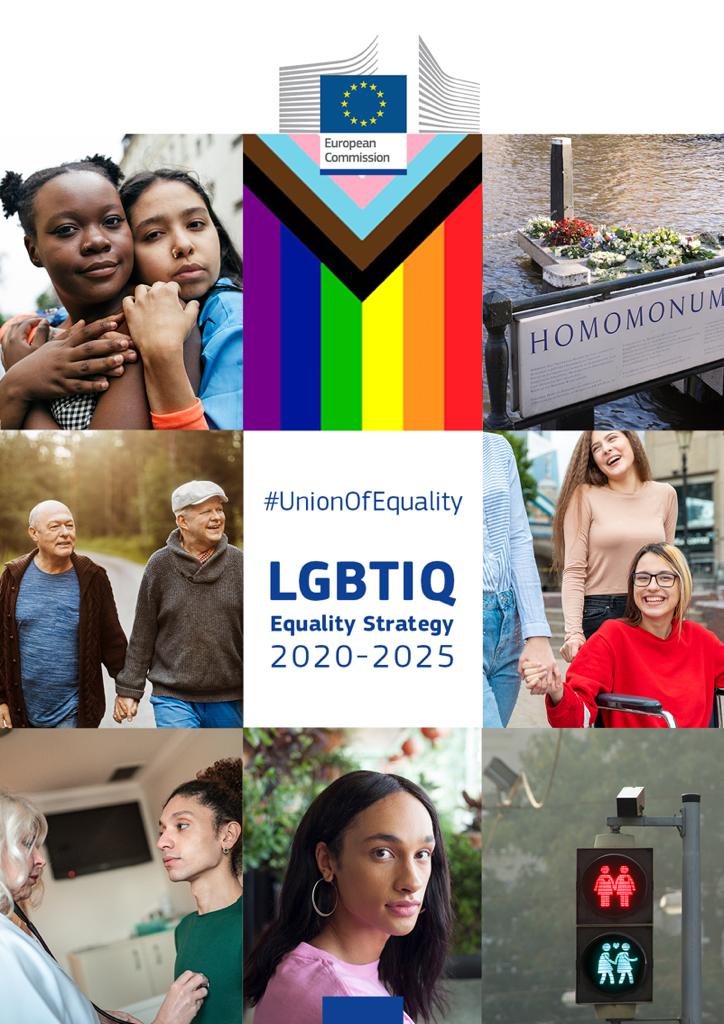
Half-way through, the evaluation of LGBTI organisations is positive, but also pointing clearly to where more is needed to ensure the implementation of the strategy in all areas of EU competence and to fully live up to the commitments the EC proudly adopted with the strategy.
With this briefing, ILGA-Europe wants to highlight five key aspects of our evaluation of the first two years of implementation and set out recommendations to ensure strong implementation of the full strategy by 2024.
The EU LGBTIQ Equality Strategy: What’s Happening One Year On?
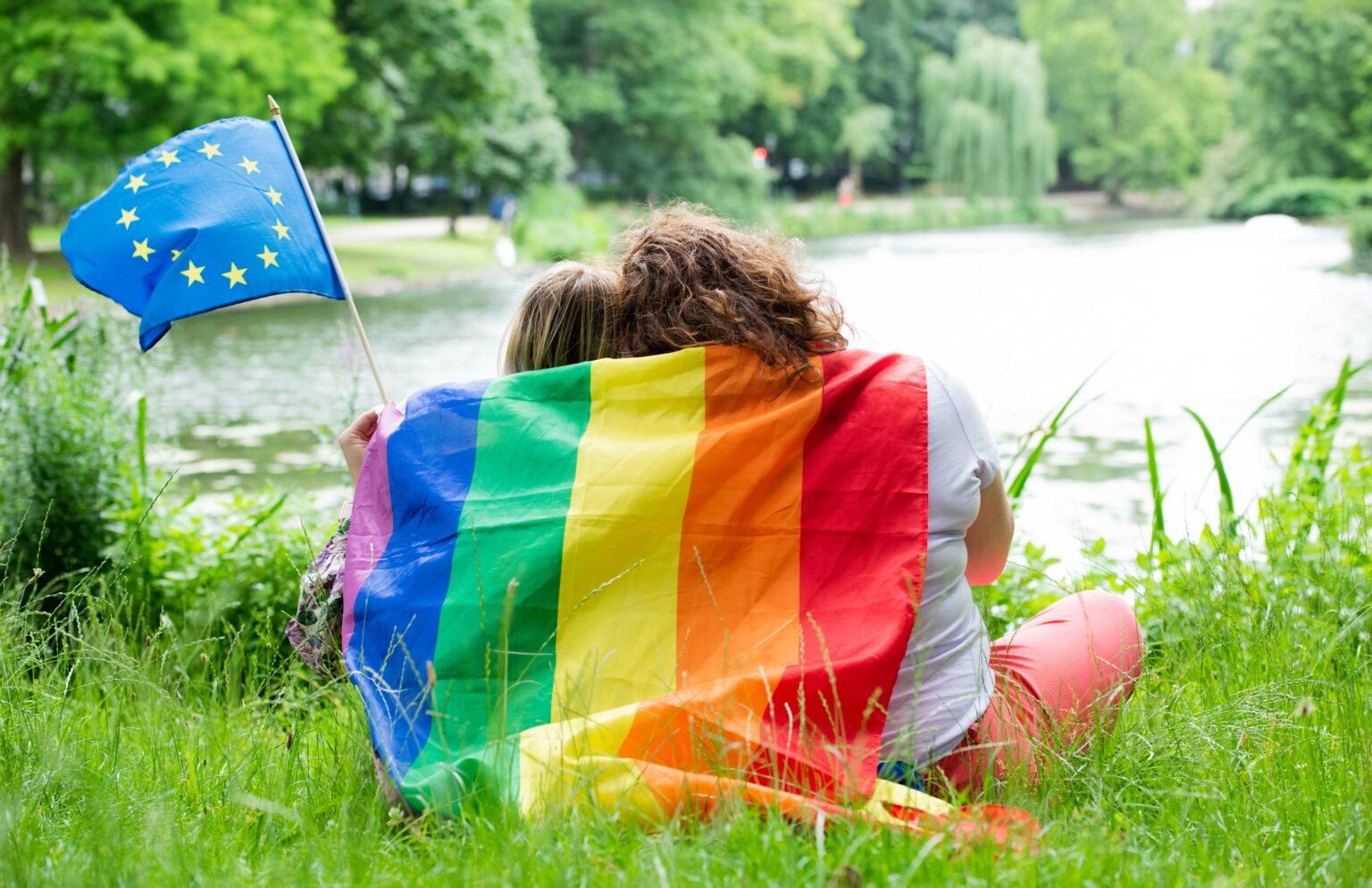
Just over a year ago, the European Commission adopted the first ever EU LGBTIQ Equality Strategy, committing to be at the forefront of efforts to better protect LGBTIQ people’s rights. But how far has the Commission gone in its implementation so far? We looked closely, and here are our five conclusions.
The adoption of the EU LGBTIQ Equality Strategy marked a strong shift from the European Commission, the executive arm of the EU, towards playing its full role to defend and protect LGBTI rights in times of real backlash. The strategy is key to the Commission’s day-to-day work to tackle discrimination. This is even more relevant at a time when the COVID-19 pandemic continues to exacerbate inequalities, hitting the most vulnerable in our communities.
In discussion with LGBTI organisations and activists across the region, as well as European networks, we’ve evaluated the first year of the EU LGBTIQ Equality Strategy. Here are the five key points from our assessment.
1. The strategy is a clear commitment to LGBTI rights
The strategy gives an important political sign of support of LGBTI rights. It also supports the inclusion of LGBTI rights in the European Commission’s work across all Directorates-General, as well as in other strategies, like the Children’s Rights Strategy. The strategy was key in putting important initiatives, including upcoming legislation on the table, and empowered the EC to be more outspoken in the protection of LGBTI rights.
2. All policy areas of the Commission must be proactive
The European Commission is divided in Directorates-General (DGs in EU jargon). Each DG takes care of one policy area. DG Justice, whose job is to ensure that the whole European Union is an area of freedom, security and justice, has been at the top of the class when it comes to setting in motion some of the activities in the strategy. Important work has begun on intersex rights, parenthood recognition and the extension of EU crimes — the list of areas of particularly serious crime with a cross-border dimension — to include hate crime and hate speech. However, a real push is needed to ensure other DGs follow the DG Justice example and pick up activities under the strategy to the same extent.
3. A timeline and naming those responsible for each activity is needed
A timeline will ensure the full implementation of all activities enlisted in the strategy. This good practice has been fruitful in the implementation of the Roma strategy and the Gender Action Plan. Also, the service unit within each DG responsible for each activity should be named.
4. European LGBTI NGO’s should be involved
The High-Level Group on Non-Discrimination, Equality and Diversity assists the European Commission in implementing existing EU law and policies. It also cooperates with EU countries through the exchange of experiences. An LGBTI subgroup to the High-Level Groups was created to organise good practice exchanges in the areas named in the strategy, for example, legal gender recognition based on self-determination, banning conversion therapy, and non-necessary interventions on intersex children, and more. These are areas where the EU cannot legislate on, as they are outside their competence, but where discrimination across the region prevails.
However, there are still conversations if and how to include non-governmental organisations (NGOs) in the LGBTI subgroup. To ensure good cooperation, European LGBTI networks should be involved in an ongoing and structured manner, while the list of participants and the agendas of the subgroup should be made available to the public.
5. Protecting sexual orientation only is not enough
At the moment, EU law only protects people against discrimination based on sexual orientation. This reflects the time when EU Treaties were adopted. However, international human rights laws have evolved ever since and the EU LGBTIQ Equality Strategy sets out a clear political ambition to defend and protect all LGBTI people, including trans, intersex and non-binary individuals.
Therefore, in implementing the strategy, the European Commission needs to push its own limitations and extend its legal protection beyond sexual orientation grounds, so as to be fully inclusive of gender identity, gender expression and sex characteristics.
The EU LGBTIQ Strategy marked the beginning of a new approach in the European Commission to LGBTI rights and equality. The Commission can play a significant role in making sure we continue to move closer to achieving equality for LGBTI people, especially in more challenging times. With the strategy, it has equipped itself to do just that.
Hope and the LGBTI Movement in 2021
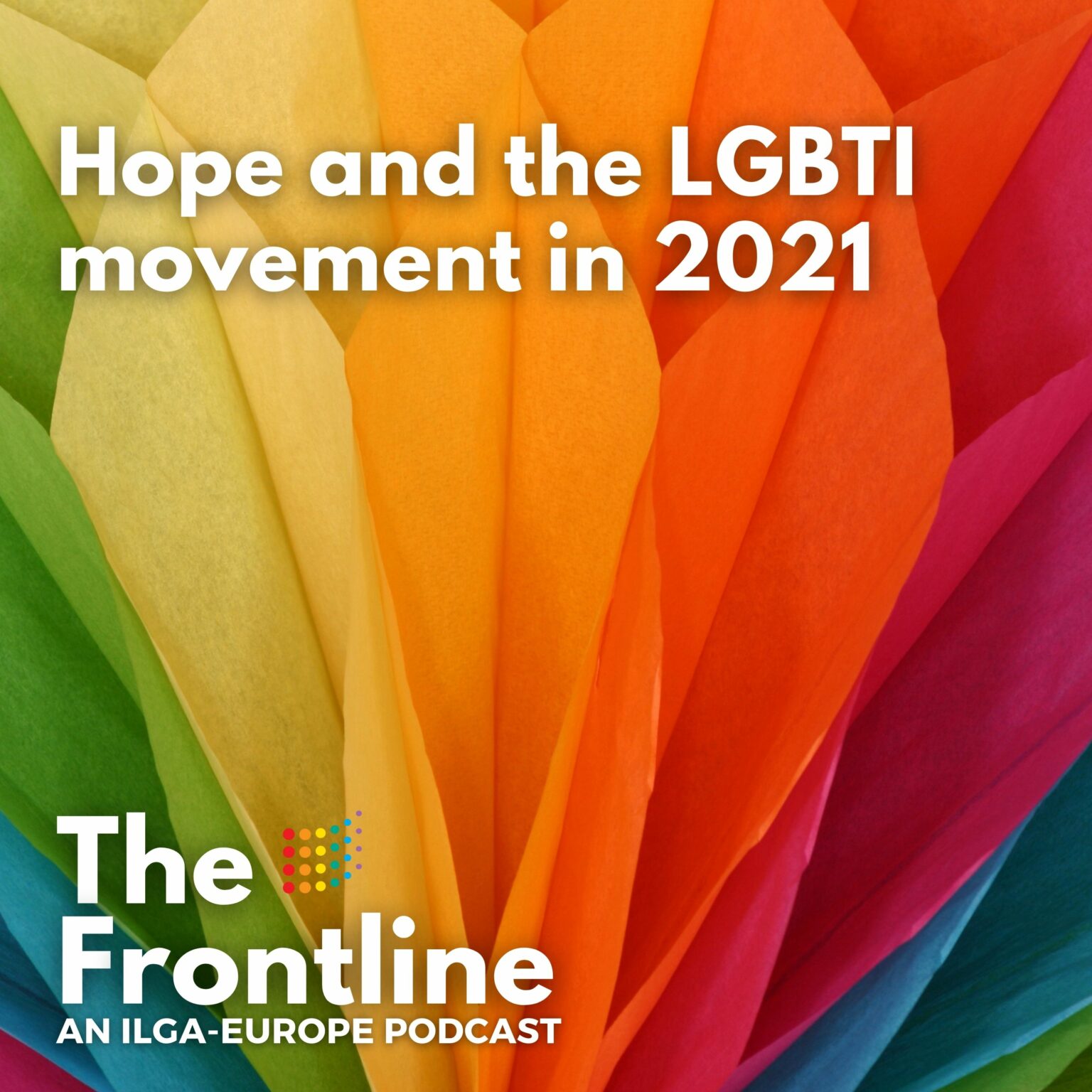
It was a year of further lockdowns, of new strains of the COVID virus, and the uncertainty they have brought, and most of all, enormous reverberations of the unprecedented events of 2020 on people’s lives.
At ILGA-Europe, when the pandemic first kicked in, our motto was ‘the work goes on’, and that work most certainly continued apace throughout 2021, with the growth of a perceived east-west divide in Europe over LGBTI rights; infringement procedures taken by the European Commission against Hungary and Poland because of their anti-LGBTI laws and programs; a sharp rise in the demonisation and isolation of trans people from the women’s movement; and an overall rise in authoritarian regimes seeking to instrumentalise LGBTI lives to limit the rights of others.
So, it’s perhaps strange that our guest in this episode, ILGA-Europe’s Executive Director, Evelyne Paradis finds great hope for the LGBTI movement amid the storm. Listen now, and find out why.
EU LGBTIQ Equality Strategy – First year implementation evaluation

The first ever EU LGBTIQ Equality Strategy, adopted in November 2020, is a major step in the EU’s overall commitment and detailed efforts to ensure the fundamental rights of LGBTIQ people and fight discrimination. Many people welcomed the strategy, including ILGA-Europe, who noted in their press release that it marks a ‘qualitative shift from the European Commission towards playing its full role to defend and protect LGBTI rights in times of real backlash’.
It is an important part of the Union of Equality, set out by European Commission President Ursula von der Leyen. The strategies and structures put in place in the 2019-2024 European Commission to mainstream equality and tackle discrimination and inequality are key, not least in a time when the Covid-19 pandemic has further shed light on poverty and exclusion across the EU, and inequalities have been exacerbated.
With this briefing, ILGA-Europe wants to set out five key points that have become clear in the first year of implementation of the EU LGBTIQ Equality Strategy. We have collected feedback from LGBTI organisations and activists from across Europe and organised a dedicated call to discuss our respective assessment of the first year of implementation with key European LGBTI networks, such as TGEU, OII Europe, IGLYO, and EL*C. In addition, the assessment was discussed in a meeting with DG Justice in September 2021 and the key points where shared following the meeting.
The Frontline: 2020 – The EU & LGBTI Equality in an Extraordinary Year
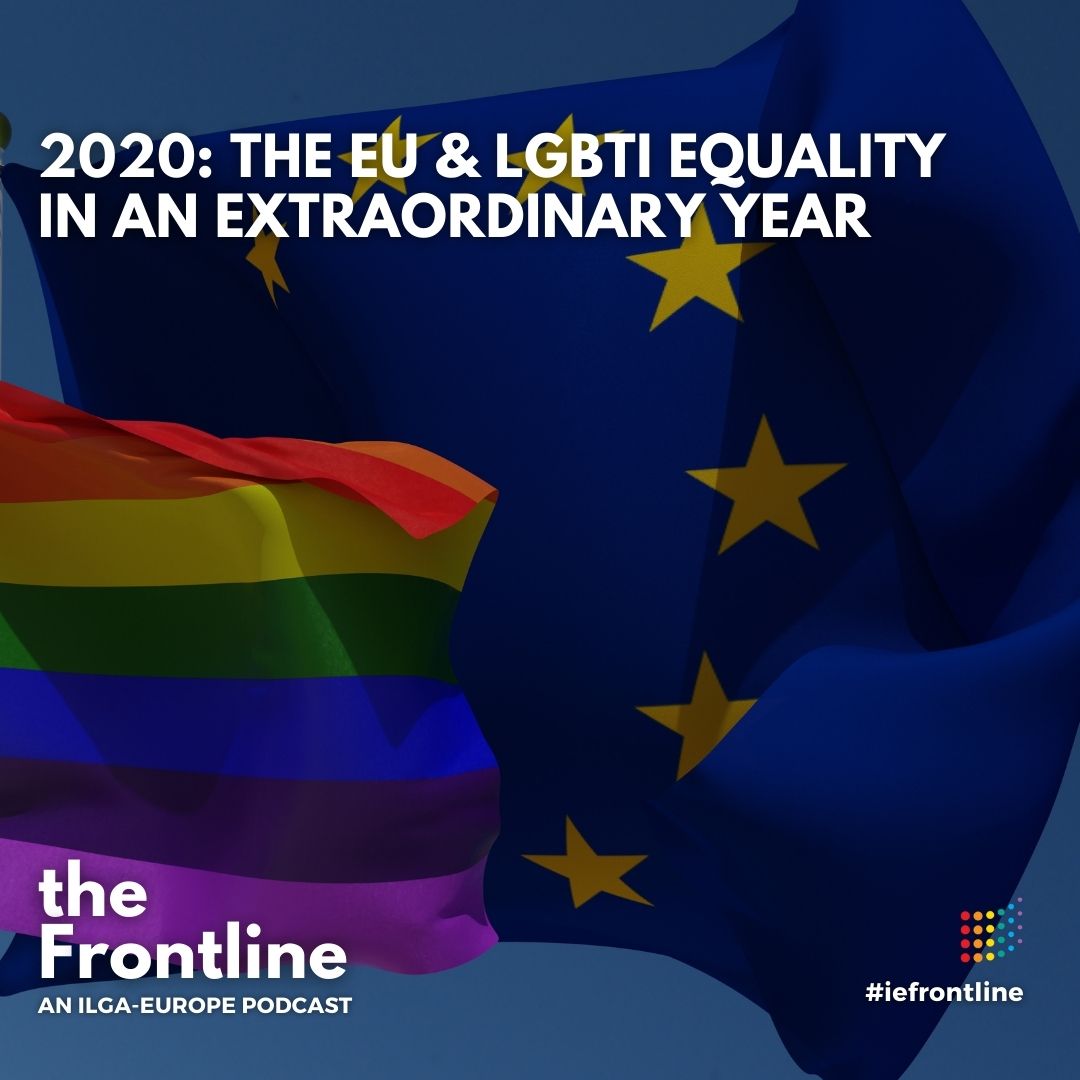
In March 2020, when the COVID-19 pandemic went global, we worried that equality would slip off EU agendas as lockdowns and an unprecedented economic crisis took hold. In this episode of The Frontline, we look back at the extraordinary year that was 2020, and the engagement of the EU in LGBTI equality issues, exacerbated during the coronavirus crisis.
Our Executive and Advocacy Directors, Evelyne Paradis and Katrin Hugendubel look back on what surprisingly turned out to be a successful year for EU engagement. Activists from ILGA-Europe member organisations in Slovenia and Hungary talk about the rise of ultra-right populism in both EU countries, Hungary’s slew of anti-LGBTI laws as the virus raged on, and their respective responses to EU institutional engagement and how it can go forward.
Members of the EU Parliament’s LGBT Intergroup, MEP’s Terry Reintke (Greens/EFA, Germany) and Maria Walsh (EPP, Ireland) give an inside view on the year gone by, and reflect on a challenging first year for the new Intergroup. It all adds up to a comprehensive look at the EU and its engagement in equality, in a Europe where LGBTI rights have become a sharp dividing line.
Listen below or click here to listen and subscribe to The Frontline on your favourite podcast platform.
The EU LGBTIQ Strategy at a glance

Yesterday, 12 November 2020, EU Vice-President Jourova and Commissioner for Equality, Helena Dalli launched the first EU LGBTIQ Strategy 2020–2025, marking a significant step forward for the European Commission in protecting and ensuring LGBTI rights. We’ve read through it, and here’s an easy-read version.
ILGA-Europe has been calling for years for an EU LGBTI strategy, so the fact that we will finally have a consolidated approach from the European Commission, setting out coordinated work between different DGs and policy areas, is a significant step. Additionally, the strategy comes at a crucial time when some members states are more and more outspoken against LGBTI rights.
Over the last few months, the policy team has been in many conversations with different Commissioner services, as well as Cabinets, discussing the possible content of the strategy. The result is a very strong document with a very clear and consolidated set of priorities for the next five years.
With the strategy, the European Commission (EC) equips itself to play a stronger role in defending and advancing LGBTI rights, and sets out a comprehensive set of actions, including legislative proposals to do that. It is interesting to see that the proposed actions also include taking a leadership role with member states where the competences lie on national level, as for example in good practice exchanges on legal gender recognition and banning so-called “conversion therapies”.
Here is our easy-access guide to what’s in the strategy
The strategy is organised in four sections:
1. Tackling discrimination against LGBTIQ people
2. Ensuring LGBTIQ people’s safety
3. Building LGBTIQ inclusive societies
4. Leading the call for LGBTIQ equality around the world
And here are some key points under each section that we know will be included:
1. Tackling discrimination against LGBTIQ people
In the first section the EC will cover action in the area of non-discrimination, employment and social protection, education and health as well as asylum. The proposed actions include:
- Clear commitments on implementation reports on the Employment Equality Directive and possible following legislative proposals, including to strengthen the role of equality bodies.
- Good practice exchanges between member states on non-discrimination protection on sexual orientation, gender identity, gender expression and sex characteristic (SOGIESC), as well as a clarification how non-binary and intersex people are best protected in non-discrimination legislation.
- Gathering data on discrimination in access to labour market, particularly for trans and intersex people, and guidance to member states on the issue.
- An expert group on gender stereotypes and bullying, regarding education.
- Support of intersectional research, including on health as well as encouraging member states to organise trainings for healthcare professionals in the care needs of LGBTI people.
- Good practice exchange between member states in the area of asylum, focusing on safe reception, protection standards and assessment of applications of LGBTIQ refugees.
2. Ensuring LGBTIQ people’s safety
A big focus in this section will be on the rise of hate across the EU and the better protection against LGBTI-phobic hate crimes, online hate, and improved victim support services. The focus is on:
- An initiative to extend the list of EU crimes to cover hate crimes and hate speech on the grounds of SOGIESC.
- Work on the Digital Service Act and full implementation of the Audio-visual Media Services Directive
- Full implementation of the EU strategy on victim’s rights, including an EU-wide communication campaign and good practice exchange between member states on victim’s rights, as well as funding opportunities in the area.
Furthermore, this section will include a focus on banning harmful practices and includes taking the lead in:
- Good practice exchanges between member states regarding intersex genital mutilation, forced medicalisation of trans people, and banning so-called “conversion therapies”.
3. Building LGBTIQ inclusive societies
A key point in this section is that the European Commission will work on ensuring freedom of movement for all. This includes:
- Implementation of the Coman judgment, through dialogue and, if necessary, legal action.
- Reviewing guidelines on free movement to ensure they include LGBTI people and rainbow families.
- Continuing to gather evidence on problems LGBTI people and their families face in enjoying freedom of movement.
- Proposing legislation for mutual support of parenthood between member states.
- Exploring measures to support mutual recognition of same-sex partnerships in cross-border situations.
Furthermore, there will be a commitment to work with member states towards legal gender recognition based on self-determination and without age restrictions.
On funding, the EC will confirm existing operational grants and project-based funding, but in addition a committee to increase opportunities for small organisations.
4. Leading the call for LGBTIQ equality around the world
Section four reiterates the EC’s strong engagement on LGBTI rights in external relations. We expect references to sharing of best practise and being a strong voice for LGBTI rights in international fora, as well as through instruments like the human rights dialogues.
This includes continued support for LGBTI human rights defenders, including rapid response and through EU funding.
There is also a renewed commitment to LGBTI rights in the accession process, including monitoring and data collection on the situation of LGBTI people in the region.
EU shifts gear with adoption of LGBTIQ Equality Strategy
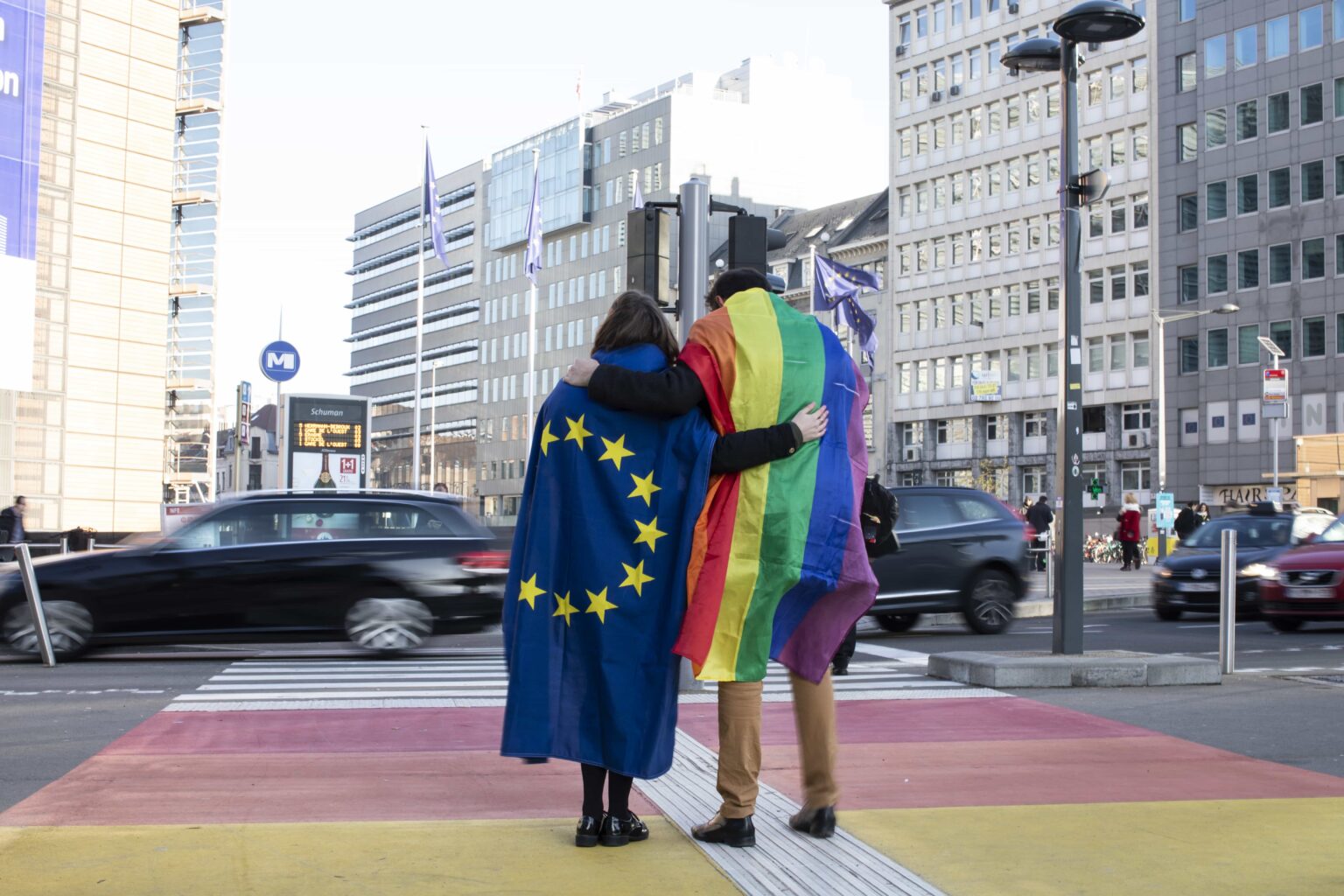
The publication today of a five-year EU LGBTIQ Equality Strategy marks a qualitative shift from the European Commission towards playing its full role to defend and protect LGBTI rights in times of real backlash, says Europe’s largest LGBTI umbrella organisation, ILGA-Europe.
Today, the European Commission (EC) Vice-President Vera Jourova and Equality Commissioner, Helena Dalli published the Commission’s ‘Union of Equality: LGBTIQ Equality Strategy 2020-2025’, following President Ursula von der Leyen’s strong commitment to LGBTI rights in her State of the Union speech in September.
According to the Strategy, the European Union “has to be at the forefront of efforts to better protect LGBTIQ people’s rights,” at a time when “discrimination on the grounds of sexual orientation, gender identity/expression and sex characteristics is actually increasing in the EU” and there is a “worrying trend in parts of the EU of more frequent anti-LGBTIQ incidents such as attacks on LGBTIQ public events including Pride marches, so-called declarations of LGBTIQ ideology free zones… and the rise of the anti-gender (and anti-LGBTIQ) movement.”
According to ILGA-Europe, an umbrella organisation for over 600 LGBTI organisations across the region, the Strategy marks the beginning of a new approach in the European Commission to LGBTI rights and equality.
Welcoming the Strategy, Katrin Hugendubel, ILGA-Europe’s Advocacy Director, said: “For the first time, the strategy sets out a clear work programme for a wide range of services in the European Commission in relation to LGBTI rights. It is committed to being true to the values set out in the EU treaties, both in areas where the EC has competencies, like for example proposing legislation to finally ensure that parents can move freely across member states without losing their parental status, to taking a leadership role in working with member states in areas where change needs to happen on national level, such as banning so-called “conversion therapies” and ensuring legal gender recognition procedures based on self determination. With its understanding that LGBTI rights are not niche issues but touch on all areas of life, the strategy clearly acknowledges the structural discrimination and marginalisation of LGBTI people.”
According to Evelyne Paradis, Executive Director at ILGA-Europe: “At the very core of this strategy is the understanding that if you are going to bring about profound change, it needs to be everyone’s business. Working alongside civil society, every political actor and department has their fundamental role to play. In order for this strategy to reverse backtracking and make the real progress it sets out to do, everyone must come on board with the same commitment to exercising institutional powers, across the board, in its implementation.”
Katrin Hugendubel continued: “With this strategy, the EC is finally using the full toolbox available, within its own competences and in working with member states, in assuming leadership in defending and advancing the rights of LGBTI people in Europe and beyond. The EC can play a significant role in making sure we continue to move closer to achieving equality for LGBTI people, especially in more challenging times. With this strategy, the Commission is equipping itself to do just that. We are looking forward to working with everyone at the Commission and other EU institutions to make sure the ambitions in the strategy translate into real change for LGBTI people across the EU and beyond.”
For further comment, please contact ILGA-Europe’s Media Office, Ana Muñoz Padrós at ana@ilga-europe.org or +32 493356055.
FRA’s 2nd LGBTI Survey points to clear need for decisive and immediate action by the EU
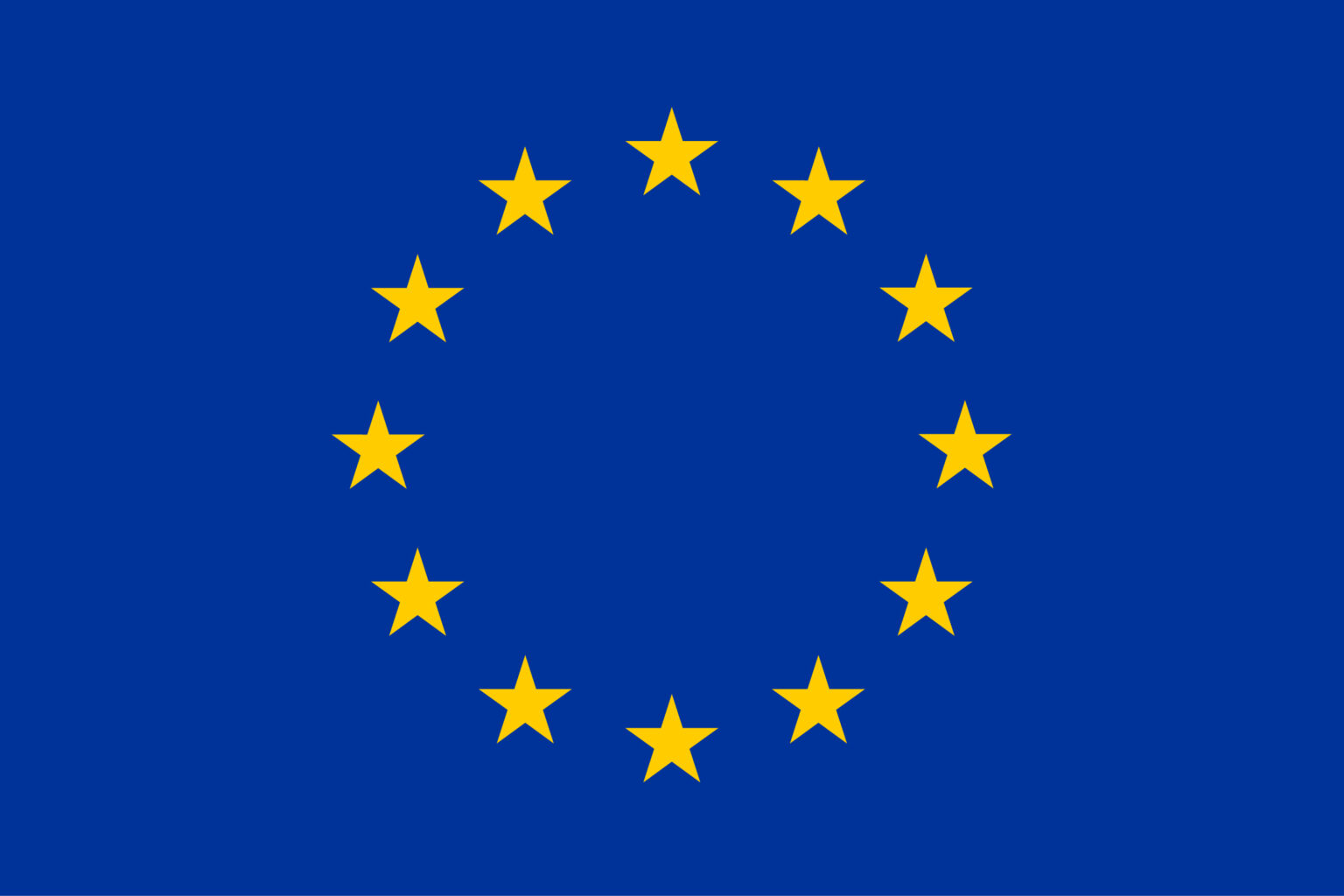
There has been little progress in the lived experience of LGBTI people in Europe over the past seven years. This is a clear message coming out of the report on the EU’s Fundamental Rights Agency (FRA) 2nd LGBTI survey published yesterday.
The survey of 140,000 lesbian, gay, bisexual, trans and intersex (LGBTI) people reveals that, overall, more LGBTI people felt discriminated against in the previous year (43 %), compared to when the first survey was taken in 2012 (37 %). While the EU averages mask important differences between countries, it is clear that discrimination and inequality continue to be widespread across the European Union. The FRA report concludes that there’s “a long way to go for LGBTI equality,” with FRA Director Michael O’Flaherty calling on policy-makers “to take note and do more to actively promote full respect for rights of LGBTI people”.
Commenting on the report, Evelyne Paradis, ILGA-Europe’s Executive Director, said: “Combined with ILGA-Europe’s Rainbow Europe Map launched yesterday, we have a uniquely comprehensive picture of the state of affairs for LGBTI people in Europe, with data on the legal and policy landscape complemented by data about the lived reality of LGBTI people in Europe. The unmistakable conclusion is there are no more excuses for complacently believing that the work on LGBTI equality is done, anywhere in Europe.”
To complete the picture, the EU Commission published today the evaluation of its “List of actions to advance LGBTI equality,” the first ever Commission policy framework. The report reflects on the achievements and lessons learned over the past five years. In her remarks, Commissioner for Equality, Helena Dalli, states that her aim is to build on the success of the List of Actions by presenting an EU LGBTI+ strategy that will strengthen the Commission’s and Member States’ efforts to combat the discrimination of LGBTI+ people in the EU and beyond.
According to Katrin Hugendubel, Advocacy Director at ILGA-Europe: “We welcome Commissioner Dalli’s ongoing commitment to present an LGBTI equality strategy by the end of the year. Today’s Commission report is reconfirming that a strong strategic framework, with the highest level political support, gives the Commission the tools to have a meaningful impact. Now, thanks to the FRA survey, we also have solid evidence of the needs of LGBTI people in the EU, pointing to where concrete action is most needed to ensure equality. The case could not be stronger for why an EU LGBTI equality strategy is needed and why action is needed now.”
The FRA Survey, conducted prior to the start of the Covid-19 pandemic, already showed that over a third (37 %) of the respondents indicated having difficulties to make ends meet. As the public health crisis unfolds, the negative impact on LGBTI people’s health and well-being, physical and economic safety, is increasingly reported. This is further reinforcing the case for targeted measures to meet the needs of those most marginalised in society, in particular LGBTI people who experience homelessness, violence, unemployment and economic precarity.
Evelyne Paradis concludes: “Equality is not a luxury item, something we do when everything is going well. More than at any other time, it is in times of crisis that we need to take action to support those who are most marginalised and disadvantaged in our societies. LGBTI people in Europe need the EU to be a leader by placing equality at the core of its political agenda now more than ever.”
Background references:
ILGA-Europe has published “EU LGBTI STRATEGY 2020-2024 – Key EU legislative and policy initiatives for LGBTI rights in Europe and beyond”. This document presents concrete proposals of legislative and policy initiatives to be included in the EU LGBTI Strategy.
For comment, contact: Ana Muñoz Padrós, ILGA-Europe: ana@ilga-europe.org, +32 493 35 60 55
EU LGBTI Strategy 2020-2024: Key EU legislative and policy initiatives for LGBTI rights in Europe and beyond – Proposal by ILGA-Europe
The policy brief presents concrete proposals of legislative and policy initiatives to be included in the EU LGBTI Strategy.
Critical time for the EU Commission to adopt a comprehensive LGBTI strategy
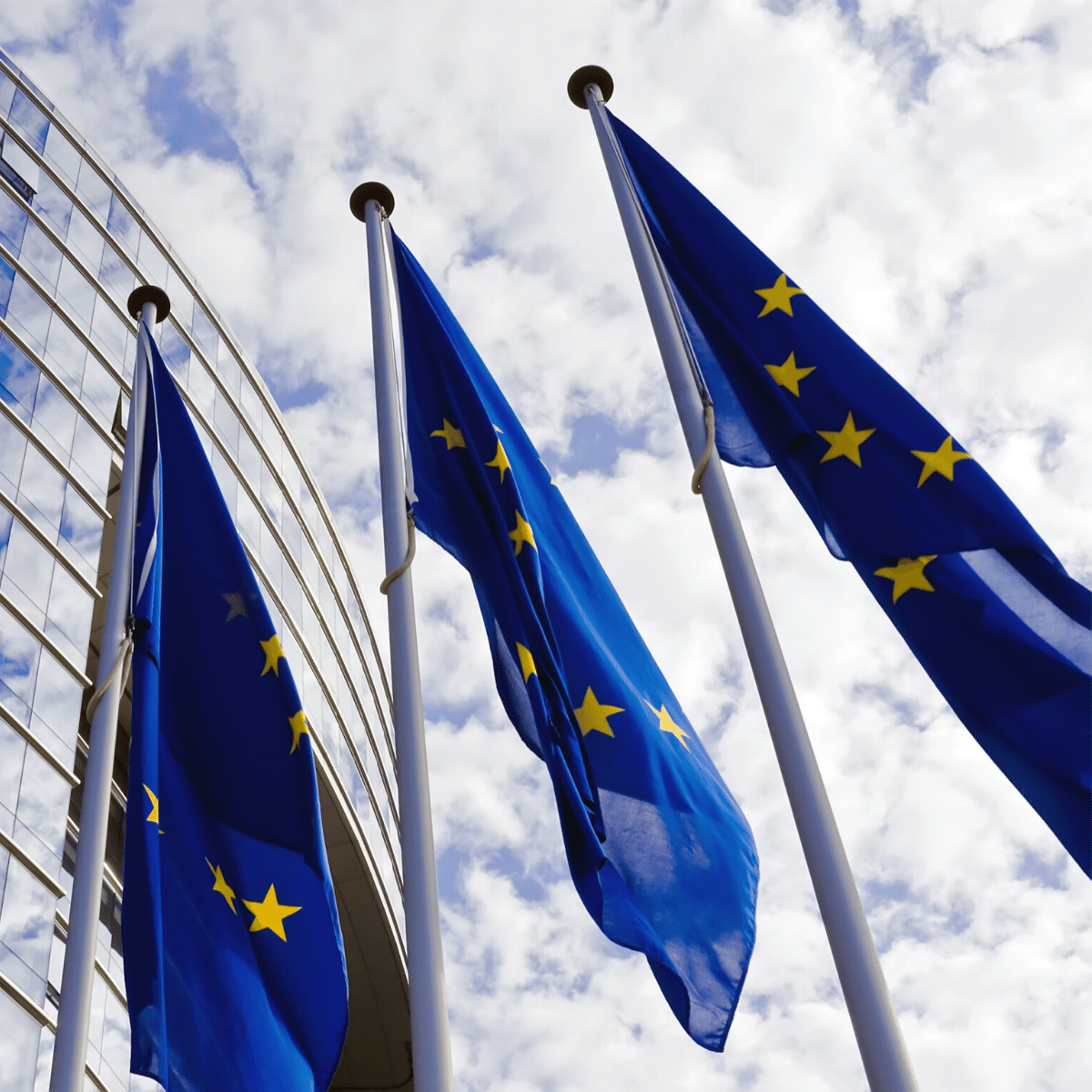
Europe is at a dangerous crossroads and that’s why this is a critical time for the Commission to adopt a comprehensive LGBTI strategy over the next five years, says ILGA-Europe, in advance of the Finnish Presidency conference on advancing LGBTI equality in the EU
On 23 September The Finnish Presidency of the Council of the European Union and the European Commission will host a high-level conference on Advancing LGBTI equality in the EU: from 2020 and Beyond, with speakers from Member States, the European Parliament, the European Commission and international NGOs. The debates and discussions of the conference will inform future policies aiming at advancing LGBTI equality in the EU.
The conference takes place at a time when the erosion of the human rights of LGBTI people along with the rise of anti-LGBT hate rhetoric in some EU countries is putting European democracy at risk and eroding core founding principles of the EU such as equality, freedom and human dignity. Over the last year, the Polish LGBTI community has been pulled into the middle of political confrontations that are stoking hatred, inciting violence and negatively impacting lives. In the run-up to the European elections and now Parliamentary elections in October, political actors from Poland’s leading Law and Justice (PiS) party – including government ministers – are carrying out a demonisation campaign against the LGBTI community whilst closely siding with conservative religious leaders.
The developments in Poland do not stand alone. In Europe and around the world, there has been a sharp rise in hate and divisiveness, often targeting marginalised groups such as LGBTI people, while in some countries regressive legislation is being introduced. In Bulgaria, the means for trans people to change their names or gender markers on official documents have been removed. In Croatia, government failed to renew action plans on equality.
Meanwhile, the governments of Bulgaria, Hungary and Turkey have failed to uphold fundamental civil and political rights such as freedom of assembly at LGBTI Pride events, freedom of association and protection of human rights defenders.
Anti-LGBTI discourse and legislation are increasingly entering the global political stage and influencing societies, propagated by populist leaders stoking fear and breeding intolerance for the sake of political gain. Politicians in the Bulgarian city of Plovdiv, one of this year’s European Capitals of Culture, campaigned to block an LGBT exhibition. Attacks by the far-right Vox party on LGBTI rights are testing years of political consensus on the issue in Spain, which in 2005 became only the third country in the world to allow same-sex marriage.
The rights and freedom of LGBTI communities is a litmus test of EU democracy and values, and upholding those rights and freedoms is core to fundamental EU values.
That is why it is vital at this critical time for the Commission to stand strong on fundamental rights and not let a minority of states erode and undermine EU values. Now more than ever it is time for the Commission to adopt a comprehensive LGBTI strategy that is wholly intersectional and consults with Parliament and civil society on how to mainstream LGBTI rights across its programmes for the next five years.
An EU LGBTI strategy, adopted and owned by the political leadership of the European Commission would give a very important political sign that the EU will not only continue but also strengthen its work on protecting and advancing the human rights of LGBTI people in the European Union. Also, it will help all Directorate Generals of the European Commission to feel empowered to ensure full implementation of existing commitments and to plan proposals and actions that will advance LGBTI human rights and equality.
A small number of governments may be pushing back on LGBTI rights and freedoms, and engaging in hateful rhetoric, but they threaten the larger body of states that are on the side of human rights at a critical time in Europe and the world.
Says Evelyne Paradis, Executive Director of ILGA-Europe: “The governments of some countries and other forces within the EU are overtly turning the tide on LGBTI and other minority rights, seeking to replace democracy and diversity with ‘traditional values’. Their voices may be loud, but we know that most member states want to see continual progress towards equality for LGBTI people in Europe.
“The rights and freedom of the LGBTI community are not separate from the rights and freedom of all who live in Europe, and the erosion of those rights is a marker for the erosion of all fundamental human rights. That is why now, more than ever, we need the next European Commission to adopt an EU-level LGBTI strategy.”
In attendance at the Advancing LGBTI equality in the EU: from 2020 and Beyond conference will be the following government representatives:
- Thomas Blomqvist, Minister for Nordic Cooperation and Equality, Finland
- V?ra Jourová, Commissioner for Justice, Consumers and Gender Equality
- Ingrid van Engelshoven, Minister for Education, Culture and Science, The Netherlands
- Terry Reintke, MEP, Co-President of the LGBTI Intergroup of the European Parliament, Greens/EFA (Germany)
- Roberta Metsola, MEP, EPP (Malta)
- Edward Zammit Lewis, Minister for European Affairs and Equality (Malta)
- Rosa Lopes Monteiro, Secretary of State for citizenship and equality, (Portugal)
- Jovana Trencevska, State Secretary (North Macedonia)
- Michael O´Flaherty, Director, Fundamental Rights Agency (FRA)
ILGA-Europe commends historical passing of two key LGBTI resolutions by European Parliament
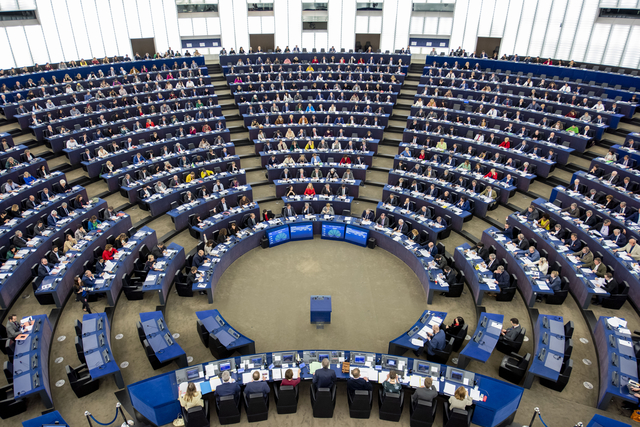
Today the European Parliament adopted two lgbti resolutions clearly calling for a strong agenda for the protection and furtherment of LGBTI equality and human rights in the next European Commission’s term.
The passing of a resolution on the future of the LGBTI List of Actions unites the European Parliament with 19 member states, who in December signed a call initiated by the Maltese government calling for an EU LGBTI strategy for 2019 – 2024.
“In the current political climate where LGBTI strategy both in the Council and the European Parliament are challenged by a small but loud opposition, this strong call by the European Parliament for the European Commission to not sway but to ensure an even stronger commitment to work on LGBTI rights in the future, is very much needed”, says Katrin Hugendubel, Advocacy Director of ILGA-Europe.
The resolution clearly calls on the Commission to ensure that LGBTI human rights are given priority in its work programme for 2019-2024, and to develop a LGBTI strategy for its next term, in consultation with the European Parliament and civil society organisations.
The European Parliament reiterated one of the demands ILGA-Europe sets out in its ComeOut pledge campaign for the European Parliament elections, which was launched today.
“The last five years showed clearly that a strategic commitment such as the LGBTI list of actions allows the European Commission to be more ambitious in its work on progressing LGBTI equality. It is important to build on the progress of the list of actions in the next term,” notes Evelyne Paradis, Executive Director of ILGA-Europe.
Second resolution on intersex rights
A second historical resolution adopted today focuses on the human rights of intersex people. Here, the European Parliament is not only acknowledging the ongoing human rights violations intersex people still face in the EU today, but also sets out clearly what needs to be done both on national and EU level, such as ensuring protection against any form of discrimination under the ground “sex” and putting in place legislation that will finally ensure a protection of intersex people’s bodily integrity.
Addressing the first candidate signatories of the ComeOut pledge, Secretary of OII Europe Kitty Anderson said “When the resolution was announced, I got messages all over Europe from intersex activists saying they felt heard and protected.”
“This is a monumental step forward for the rights of intersex people and is something we can truly build on.”
“Intersex rights need to be clearly integrated into all work of the EU institutions in the future, and the future LGBTI strategy needs to set out clearly how the European Commission will work to ensure the full protection of intersex human rights, including supporting member states in putting in place legal protection of intersex people’s bodily integrity,” Paradis adds.
- Read more about the common paper prepared by the Maltese government and signed by 19 member states in December 2018, calling for continued efforts within the EU to ensure full protection of LGBTI rights.
- See OII-Europe and ILGA-Europe’s join statement from earlier today about the landmark resolution on the rights of intersex people.
- Yesterday evening in Strasbourg, candidates from all major EU political parties (EPP, S&D, ALDE, GUE/NGL, Greens-EFA) were the first to officially sign our Come Out Pledge. Read more about our brand-new campaign for the European Parliament elections here.
Joint paper from 19 Member States for an EU LGBTI strategy
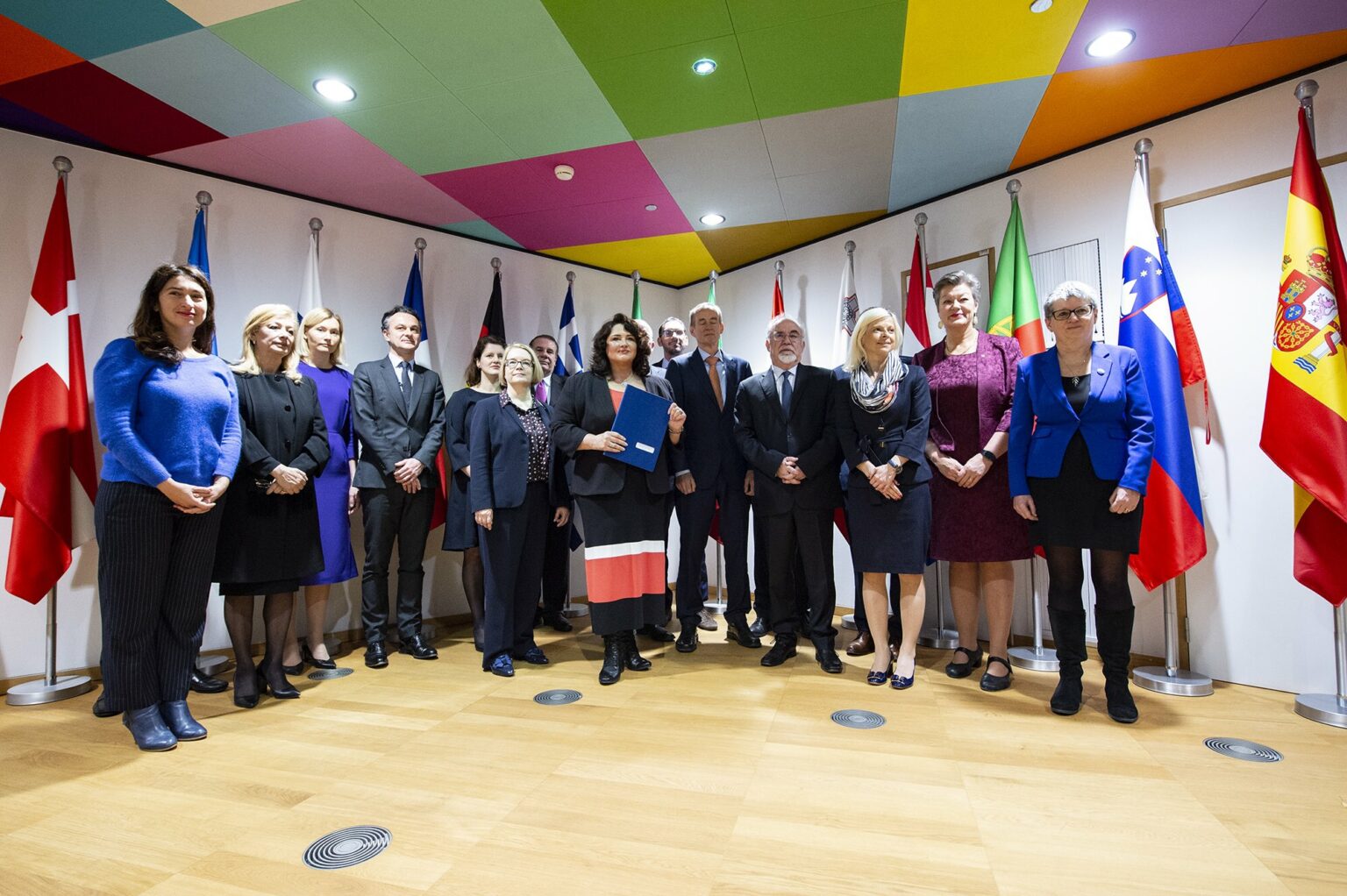
Majority of EU member states clearly speak out that the EU needs to stand firm regarding the protection of the rights of LGBTI people.
Today, 19 EU member states signed a common paper prepared by the Maltese government, calling for continued efforts within the EU to ensure full protection of LGBTI rights. The paper called on the next European Commission to ensure strong follow-up of the current EC LGBTI list of actions and adopt a coherent EU LGBTI strategy.
The signatory countries of the paper are Malta, Czech Republic, Italy, France, Slovenia, Germany, Belgium, Luxembourg, Netherlands, Spain, Portugal, Greece, UK, Ireland, Finland, Sweden, Denmark, Estonia, and Cyprus.
In the EPSCO Council debate this afternoon, the signatory member states showed an immediate commitment to ensure that the EU lives up to obligations to protect LGBTI rights, refusing to accept to adopt Council Conclusions regarding “gender equality, youth and digitalization”, from which the Austrian Presidency had deleted a reference to LGBTIQ people on the request of Poland and Hungary.
“It was very reassuring today to see a majority of member states drawing a line and speaking out clearly and strongly about the fact that taking out a reference to LGBTIQ people as protected group is unacceptable.” said ILGA-Europe’s Executive Director Evelyne Paradis. “We would like to thank all member states who spoke out and stopped this attempt that would have marked a clear step backwards from EU treaty obligations and agreed text within the EU institutions. “
Over the last two years, Poland and Hungary several times explicitly called for the exclusion of LGBTI people from EU protection, both in the European Council and before the European Court of Justice.
“It was important that member states today were clear that this is unacceptable. As regrettable as it is, that this means that Council Conclusions could not be adopted, the EU cannot be taken hostage by 2 countries and be forced to dismantle agreed non-discrimination standards.” commented ILGA-Europe’s Advocacy Director Katrin Hugendubel.
ILGA-Europe will built on the support shown today and will continue to work with member states and the European institutions to ensure that all ground set out in the Charter of Fundamental Rights are equally protected in EU policymaking. A strong commitment from the EC in the form of an LGBTI strategy for the next mandate will be key to close protection gaps for LGBTI people.